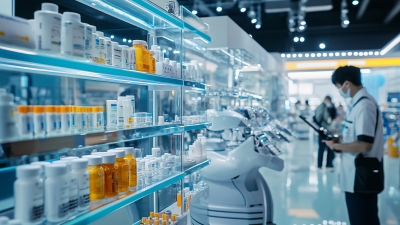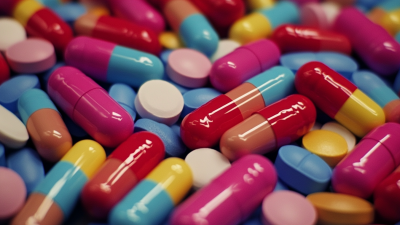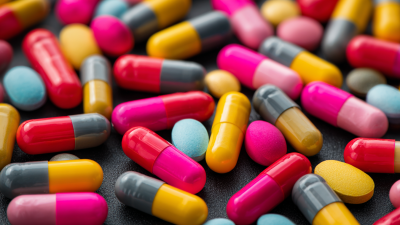
7 Best Practices for Efficient Peptide API Manufacturing You Must Know
In the rapidly evolving landscape of biopharmaceuticals, the importance of efficient Peptide API Manufacturing cannot be overstated. As the demand for peptide-based therapeutics continues to surge, manufacturers are challenged to optimize their processes while ensuring high quality and regulatory compliance. This blog will explore seven best practices that can significantly enhance the efficiency of peptide active pharmaceutical ingredient production. By implementing these strategies, manufacturers can not only streamline operations but also reduce costs and improve time-to-market for their peptide products. Whether you are an industry veteran or new to the field, understanding these essential practices will equip you with the knowledge needed to thrive in the competitive realm of peptide API manufacturing. Join us as we delve into the key methodologies that can make all the difference in achieving manufacturing excellence.

Key Considerations for Choosing Raw Materials in Peptide API Manufacturing
When it comes to peptide API manufacturing, the choice of raw materials plays a crucial role in determining the efficiency and quality of the final product. The peptide market is projected to reach $41 billion by 2028, emphasizing the need for manufacturers to optimize their processes and inputs. Selecting high-purity starting materials can significantly reduce impurities and enhance yield, ultimately leading to more reliable production timelines. Industry data shows that utilizing premium grade reagents can improve peptide coupling efficiency by as much as 30%, thereby streamlining manufacturing operations.
Tip: Always verify the supplier's certifications and quality assurance processes. Quality assurance standards such as cGMP are vital in ensuring the reliability of raw materials in peptide synthesis. Additionally, consider sourcing from suppliers that provide detailed COAs (Certificates of Analysis), which serve as a testament to the purity and quality of the materials.
Furthermore, it's essential to assess the stability and solubility of the raw materials you choose. According to reports from the International Peptide Society, roughly 25% of peptide failures during production can be attributed to solubility issues. For optimal results, utilize solvents that enhance solubility without detracting from the stability of the peptide chains. This approach not only elevates the quality of the synthesis but also minimizes costly production setbacks.

Streamlining the Peptide Synthesis Process for Maximum Yield
The peptide synthesis process is intricate, necessitating a streamlined approach to maximize yield while minimizing waste. Effective planning and optimization at each stage of peptide API manufacturing can significantly enhance productivity. By implementing an efficient workflow, manufacturers can ensure that each step, from amino acid selection to purification, contributes to a higher overall yield.
 One essential tip for improving the synthesis process is the use of high-quality reagents. Investing in premium amino acids and coupling agents can prevent common synthesis issues such as incomplete reactions, which can lead to lower yields. Additionally, incorporating automated synthesizers can facilitate precise control over reaction conditions, reducing human error and variability in the production process.
One essential tip for improving the synthesis process is the use of high-quality reagents. Investing in premium amino acids and coupling agents can prevent common synthesis issues such as incomplete reactions, which can lead to lower yields. Additionally, incorporating automated synthesizers can facilitate precise control over reaction conditions, reducing human error and variability in the production process.
Another valuable practice involves optimizing purification techniques. Employing methods like high-performance liquid chromatography (HPLC) can help in efficiently isolating the desired peptide from byproducts. Regularly reviewing and refining these purification protocols can lead to enhanced recovery rates, ultimately impacting the overall yield positively. By focusing on these strategies, manufacturers can streamline their peptide synthesis processes effectively.
Importance of Quality Control Measures in Peptide API Production
Quality control measures are a crucial component in peptide API production, ensuring that the final product meets stringent safety and efficacy standards. The complexity of peptide synthesis, which often involves intricate processing techniques, necessitates a rigorous approach to monitoring each stage of production. By implementing comprehensive quality control protocols, manufacturers can identify potential issues early in the process, reducing the risk of contamination and ensuring the integrity of the peptides.
Additionally, consistent quality control practices enhance overall operational efficiency by minimizing waste and rework. The use of advanced analytical techniques, such as mass spectrometry and high-performance liquid chromatography (HPLC), allows for meticulous characterization of peptides at various stages. These methods not only confirm the identity and purity of the peptides but also help in verifying that they are synthesized in accordance with predefined parameters. As a result, manufacturers can ensure compliance with regulatory requirements while also fostering trust with clients and stakeholders who depend on high-quality peptide APIs for their therapeutic applications.
7 Best Practices for Efficient Peptide API Manufacturing
This chart illustrates the importance of various quality control measures in peptide API production. Each measure plays a crucial role in ensuring product quality and consistency.
Effective Scaling Strategies for Large-Scale Peptide Manufacturing
In the realm of peptide manufacturing, effective scaling strategies play a pivotal role in meeting the surging demand for peptide-based therapeutics. Recent advancements in peptide drug development signal promising opportunities for large-scale production. The approval of over 14 peptide drugs by regulatory agencies in just the past five years underscores the increasing significance of strategic collaborations across various disciplines in drug development.
To ensure efficient scaling, manufacturers must adopt precise nanoscale fabrication technologies that optimize production processes. These strategies, involving both "Top-Down" and "Bottom-Up" approaches, can enhance the synthesis of bioactive peptides, crucial for various applications in fields such as food science and medicine.
Moreover, tackling challenges associated with the high costs of recombinant growth factors and serum proteins can significantly reduce the overall expenses in peptide manufacturing, fostering a more sustainable production model. As the oral peptide delivery market experiences robust growth, driven by innovations in drug delivery systems, implementing these best practices will be essential for achieving efficiency in large-scale peptide manufacturing.
Utilizing Advanced Technologies to Enhance Peptide API Efficiency
In the realm of peptide API manufacturing, employing advanced technologies is paramount to enhancing efficiency and output quality. Techniques such as high-performance liquid chromatography (HPLC) and automated peptide synthesizers have revolutionized the process, ensuring precision and minimizing human error. Incorporating these technologies not only accelerates production timelines but also significantly improves the purity of the final product.
To further optimize operations, manufacturers should consider utilizing continuous flow reactors. This modern approach allows for more consistent reaction conditions and improves scalability, facilitating the rapid synthesis of peptides in a controlled environment. Additionally, the integration of artificial intelligence (AI) for predictive analytics can assist in resource allocation and process optimization, ultimately reducing waste and operational costs.
Investing in robust quality control measures through technologies like real-time monitoring systems can lead to higher efficiency in peptide API production. These systems enable manufacturers to detect deviations early and adjust processes accordingly, ensuring compliance with stringent regulatory standards. By embracing these advanced technologies, peptide manufacturers can streamline their operations and maintain a competitive edge in the market.
Related Posts
-

The Ultimate Guide to Sourcing High Quality Raw Materials for Your Business Success
-

Unlocking Global Opportunities in Pharmaceutical Products at the 137th Canton Fair 2025
-

How to Source High Quality Pharmaceutical Chemicals for Global Supply Chains
-

Benefits of Choosing Best Pharma Material for Your Business Success
-

Unique Uses of Pharmaceutical Intermediates in Drug Development
-

2025 Global Market Insights: 7 Essential Tips for Sourcing Pharmaceutical Products Effectively
